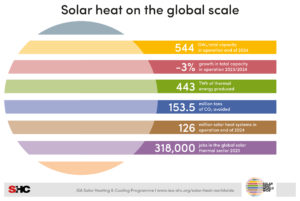Solar Thermal e-Learning: Education without a Classroom
February 9, 2010
Electronic »e-Learning« programmes for solar heating are beginning to gain popularity with training centres in the UK. These are designed to assist training centres in teaching solar domestic hot water installation techniques to apprentices and engineers.
One software package is called the Skills2Learn Solar Domestic Hot Water (SDHW) programme, which in October 2009, won the UK Solar Trade Association’s Best Innovation Award. It is increasingly being distributed by training centres as a virtual reality practice tool for students.
The Skills2Learn package is available on CD, online or as a server edition, and has recently been adopted by UK Train4Trade Skills courses as part of the solar module on their distance learning Plumbing Professional Course. The program is also being used in Europe as part of a larger project funded by European Regional Development Fund. It is being used by training organisations in Norway, Sweden, Denmark, Germany, Holland, Belgium and the east coast of the UK.
The programme was developed by an E-Solar consortium in the UK which includes among others Hammersmith & West London College, The College of North West London and the company Themba Technology Ltd. The developers are keen to enable apprentice heating engineers to graduate with the ability to install solar water heating. However, presently it is just a training course with no UK certification given on completion and so users will need to seek alternative certification after graduation.
Where the programme is used as part of an apprenticeship scheme, any technical queries by the student can be answered by course tutors. The course is yet to be endorsed by particular manufacturers or government departments but it is planned to be the first of a series of nine programmes teaching installation techniques for environmental technologies.
The e-learning programme uses interactive multimedia, including audio, text and video, to guide users through a series of tutorial-based modules. These are designed to give students an understanding of installation techniques, including:
- Basic solar thermal practicalities
- Collector types
- Standards
- Health and safety
- Thermal storage options
- Primary circuit designs and controls
- Installation materials, components and fittings
- Filling, commissioning and maintenance procedures
At the end of each module trainees undertake a self-assessment including simulated ‘real-life’ scenarios. The assessments terminate with a score report with constructive feedback. The method of »eLearning« will suit some students but those with a more kinaesthetic learning style would benefit from combining the course with additional practical elements provided by either a training centre or apprenticeship scheme.
So far the course is only available in English, but the developers hope that future programmes will be made available for non-English languages.
The package can be either purchased or rented at the Skills2Learn website:
http://www.elearning-shop.co.uk/solar-heating.htm


